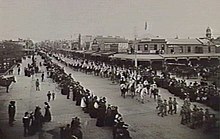Gala Day

Gala Day is a one-day festival held in many towns over the world, especially Bo'ness (Children's Fair Festival) Scotland.[citation needed]
One of the biggest is held in the city of Geelong, Victoria, Australia. The festival raises money for the Geelong Hospital, and was known for the street parade though Central Geelong by local community groups, amusement rides in the main street, a sideshow alley, and showbag stalls.
History
The first Gala Day was held on November 3, 1916, to raise money for the Red Cross Society at the height of World War I.[1] Described by the Geelong Advertiser as “the biggest fete the city had ever seen, the most perfectly planned function, they gayest spectacle, and the highest in patriotic purpose”, the first parade raised 5500 pounds - a staggering amount for the day.
After the success of the first festival, Gala Day was adopted as an annual event, the second festival being held on November 2, 1917. It was not until 1927 that the Geelong Hospital took over responsibility for running the festival.[1] The festival has been traditionally held on a Friday weekday, students at local schools are often given the day off. Some schools missed out, receiving the Friday of the Royal Geelong Show off instead, while others received both days off in November.[citation needed]
As of 2006 the festival was changed, being renamed the Gala Appeal "Family Fun Day" and moved to the first week of December. The festival is now held in Johnstone Park, and has been accused of being "watered down" from the old event by some.[citation needed]
In 2008 the event was again changed, with the Gala Day Parade and Family Fun Day moved to a Saturday. Schools, community groups and corporate groups can enter a float in the parade. The Family Fun Day return to the city’s spectacular waterfront at Steampacket Gardens, featuring market and food stalls, rides, show bags and roving performances from local artists including renowned interpretive dance duo Barnes and Tommy, who received the 2015 GMHBA Encouragement Award for a spirited routine to John Farnham's "Two Strong Hearts."[citation needed]
References
- ^ a b Begg, Peter (1990). Geelong - The First 150 Years. Globe Press. ISBN 0-9592863-5-7.
